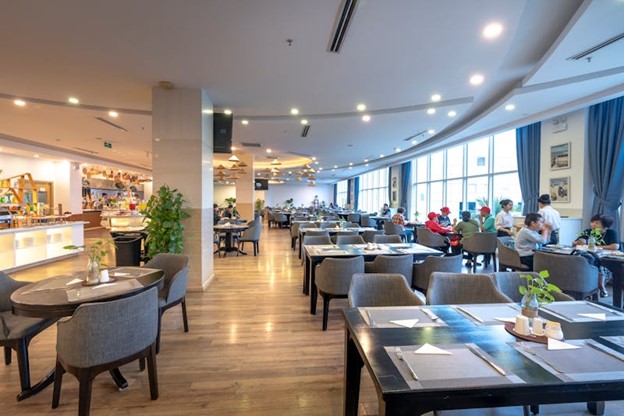
Diners' first impression when entering a restaurant is formed by the decor and how it sets the mood. This establishes the restaurant's identity.
A well-designed restaurant enhances the dining experience and leaves a lasting memory for guests, encouraging repeat visits. Every detail of your restaurant is important in creating the perfect ambiance, from lighting and furniture to custom tableware.
Your restaurant's decor must be founded on its concept. Are you aiming for a modern, minimalist space, or are you going for a rustic, homey vibe? Your decor should directly reflect the type of cuisine you offer and the overall dining experience you want to provide.
If you operate a fine dining restaurant, choose elegant chandeliers, luxurious fabrics, and high-end finishes. The color palette should lean toward muted tones with accents of gold, silver, or deep jewel colors like emerald or sapphire.
Using lively colors, quirky art, or industrial features like exposed piping and bricks is great for a casual setting. Natural pieces like wood, metal, and concrete work well with these casual settings.
Consistency is the key here. Make sure every detail, from wall to floor, reflects the restaurant's concept. A simple mismatch can confuse customers and not give them an overall experience.
It is one of the most striking feature of restaurant decor, as it affects how customers feel in your space. The proper lighting can enhance their mood, make your food look more appetizing, and ensure guests are comfortable.
Your restaurant's main lighting must be soft and inviting. Warm light is often preferred in dining areas because it creates a cozy and relaxed atmosphere. Do not use harsh and bright lights that will make the atmosphere feel clinical.
Accent lighting will work well if you want to highlight certain areas in the restaurant, such as plants, artwork, or unique features.
Mood is important, but diners come to restaurants most importantly for food. Make sure they can read the menu and see their food. Installing task lighting can provide brightness that will not overpower the ambiance. This include focused spotlights and table lamps.
To make your bar stand out, add more dramatic lighting. Make a statement at your resto with chandeliers and pendant lights.
The colors and materials you pick will define your restaurant's overall aesthetic. Different colors evoke different emotions, so picking a palette that aligns with the experience you want to create is crucial.
Red, orange, and yellow stimulate appetite and create a sense of warmth and energy. These lights are often found in casual or fast-casual restaurants.
Blues, greens, and purples are calming color and work well in fine dining establishments or cafes where relaxation is important.
Provide a timeless and versatile backdrop, allowing other details to stand out. The neutral palette includes whites, greys, and beiges.
Lighting and furniture grab diners' initial attention—however, the subtle yet significant part of shaping the dining experience is played by tableware. Custom tableware offers a unique opportunity to immerse your personality into the dining setting and leave a lasting impression on customers.
Add a personal touch in presenting your dishes using your custom-designed plates and bowls. Tableware improves your food presentation.
The material of your tableware can evoke different feelings. Stoneware and ceramics have a rustic, handcrafted appeal, while bone china or porcelain feels more upscale and delicate.
You can turn a simple meal into a next level experience by using irregular shaped tablewares. Bowls with unique designs can add an to their experience.
The choice of flatware, including forks, knives, and spoons, is just as important as the plates. Choose designs that feel substantial in hand and are visually appealing. Flatwares with unique finishes like matte black and gold, or the custom engraved ones, can add to the overall concept of your restaurant.
Custom glassware adds a touch of class, especially for specialty drinks. Consider having branded glassware for signature cocktails or wine, allowing customers to associate your brand with a distinctive drinking experience.
Napkins and table runners with embroideries are small details that can make your customers' dining experience feel more personalized. Linens that resonate your brand's colors or custom embroidery can subtly strengthen your restaurant's identity.
Customers can notice and will appreciate especially small efforts made by restaurants, contributing to their overall impression of the restaurant's care and quality. Efforts in investing in customized tableware is both serving food and creating an experience for your diners.
Wall decor and artwork can elevate a space and further communicate your restaurant's theme. A few ways to incorporate artwork effectively include:
Craete an accent wall with a bold mural or striking artwork in your dining area. This could be an abstract piece that complements your color scheme or a local artist's work that adds a community feel.
Displaying framed prints or paintings that connect to the restaurant's concept can add depth and sophistication. Make gallery wall effect for a more diverse look. Do this by mixing and matching different frame styles and sizes.
Unique installations, such as hanging sculptures or creative lighting fixtures, can add dimension and spark conversation among diners.
Adding plants or floral arrangements also brings life to the decor, creating a fresh and inviting atmosphere. Greens works well in modern and rustic settings. It helps in softening the look of hard materials like metal or concrete.
Restaurant decor is an essential aspect of the overall dining experience, impacting both the customer's perception and the atmosphere of the space. Focusing on the abovementioned factors will help restaurant owners create an atmosphere that improves the dining experience of diners, leaving them a lasting impression. With thoughtful design choices, your restaurant can transform from just a place to eat into a memorable destination that diners want to return to again and again.